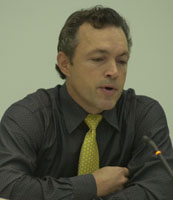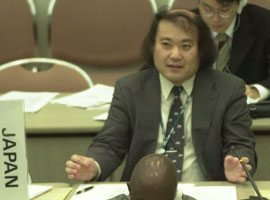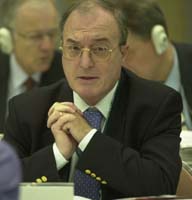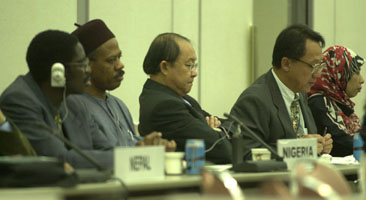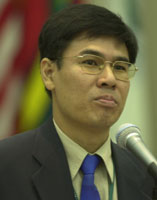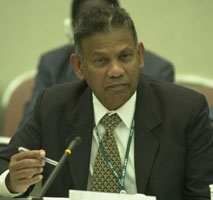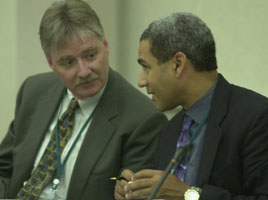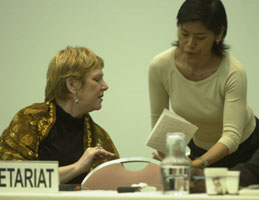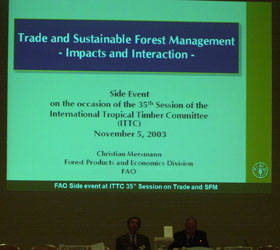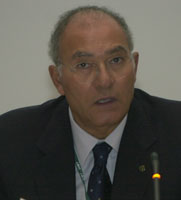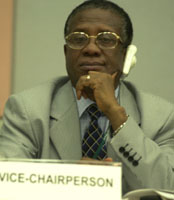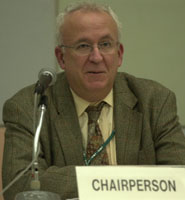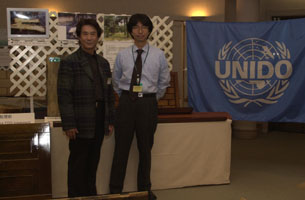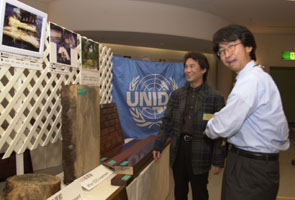Daily Coverage
|
|
International Tropical Timber Council: Thirty-Fifth
Session
|
Yokohama, Japan | 3 - 8 November
2003 |
Highlights
from Wednesday, 5 November
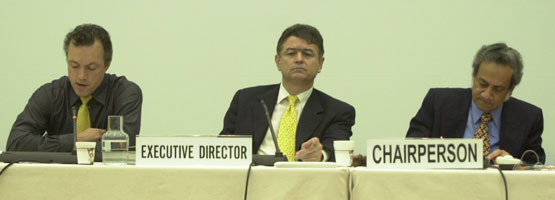
On
Wednesday, delegates convened in both Council and committee sessions.
In the morning, the Council discussed forest law enforcement and governance;
ITTO Objective 2000; and possible Council decisions. In the afternoon,
the Committees on Reforestation and Forest Management (CRF), Economic
Information and Market Intelligence (CEM) and Forest Industry (CFI),
and Finance and Administration (CFA) convened. A side event also convened
on trade and sustainable forest management, as well as an committee
meeting of the ITTO fellowship programme.
Photo: Manoel
Sobral
Filho, ITTO Executive Director, ITTC-35
Chair Bin Che Freezailah, Malaysia
|
|
|
Stephen
Johnson, Secretariat, presented the report on the case
study on export and import data on tropical timber products
in the context of international trade (ITTC (XXXV)/12). He noted
that the case study would likely be comprised of twelve country
studies, and expressed hope that resources could be devoted
to synthesizing their reports.
|
|
|
Comments
from delegates on the forest
law enforcement and governance
|
|
Malaysia
speaking as Coordinator of the Trade Advisory Group
(right),
noted that: the forest sector has suffered high job loss
in recent years; discussions on illegal logging have become
politicized; project funding for plantation developments should
be increased; and industry needs to be included in future discussions
on mahogany in CITES deliberations. He said that the successor
agreement should be strengthened to enable more substantive
debate on illegal trade.
|
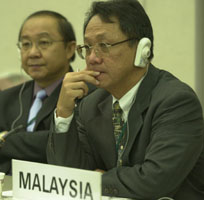
|
|
|
Delegates
from Nigeria and Malaysia
Norway
(right) described a technology, which converts softwood
into a tropical hardwood-like material and discussed the resulting
negative impact on producer countries.
|
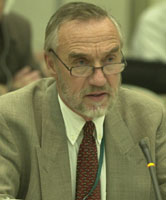
|
| Chen
Hin Keong, Senior Forest Trade Advisor, Traffic International,
Don Wijewardana, New Zealand, and David Brooks and Chris Ellis,
US |
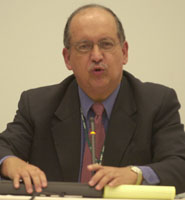 |
ITTO
Objective 2000
Tapani
Oksanen, INDUFOR (right), presented the findings of
a diagnostic mission to identify obstacles to implementing
the ITTO Objective 2000 in Peru. He said that obstacles include:
illegal and informal forestry operators; policy decentralization;
weak regional government capacity; and minimal political support
for sectoral reform. He recommended, inter alia: the continued
involvement of civil society; strengthening the monitoring
of implementation; and improved cross-sectoral coordination.
Peru
(left) noted
current efforts to address illegal logging and optimize forest
yields, and stressed political and financial costs of sector
reform.
|
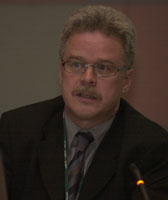 |
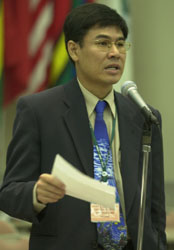 |
Chen
Hin Keong, Senior Forest Trade Advisor, Traffic International,
|
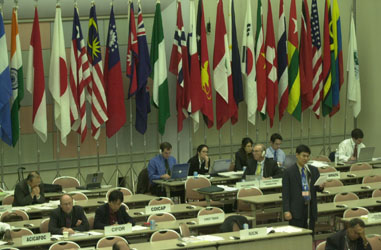 |
|
|
Vice-Chair
Jan McAlpine, US (left) |
|
| Side event:
FAO: Trade and Sustainable Forest Management: Impacts and Interactions |
|
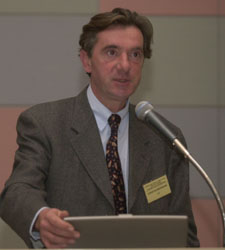 Christian
Mersmann, FAO, discussed FAO's effort to assess the impacts
and interactions between the forest products trade and sustainable
forest management (SFM), highlighting its various components,
which include: research and analysis; expert consultations;
round table discussions; the publication of research findings;
and mainstreaming, dialogue and cooperation. He noted that the
impacts and interactions between trade and SFM have been insufficiently
studied and emphasized the need for increased policy coherence. Christian
Mersmann, FAO, discussed FAO's effort to assess the impacts
and interactions between the forest products trade and sustainable
forest management (SFM), highlighting its various components,
which include: research and analysis; expert consultations;
round table discussions; the publication of research findings;
and mainstreaming, dialogue and cooperation. He noted that the
impacts and interactions between trade and SFM have been insufficiently
studied and emphasized the need for increased policy coherence.
Mersmann
gave an overview of the worldwide forest products trade, noting:
the gross value of interregional trade in raw wood; the global
market share of wood and wood-based products; the global growth
of forest plantations; and the share of plantation timber in
global wood supply forecasted for 2020.
Mersmann
then described how the FAO project relates to, inter alia: environmental
services; national level coherence of trade, environmental,
agricultural, and economic policy; the international forest
regime; the international trade regime, including the impact
of multilateral environmental agreements on trade policies;
market access and development issues related to import policies,
such as non-tariff barriers, and export policies, such as subsidies
or direct payments; market access and forest certification,
including eco-labelling; governance; and the private sector.
He said
the impacts and interactions of these issues would be assessed
in terms of their effects on market share and prices, and stressed
the need to balance trade liberalization with environmental
and social concerns in line with the implementation of the Doha
development agenda. Mersmann announced that a report on the
FAO trade and SFM project would be released in March 2004.
|
|
|
Hosney
El-Lakany, Food and Agriculture Organization (FAO) |
|
| Committee on
Economic Information and Market Intelligence and Committee on
Forest Industry |
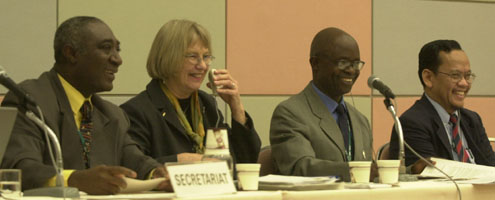 |
Emmanuel
Ze Meka, Secretariat, and Co-Chairs Astrid Bergquist and Kaya
Gilbert |
| Committee on
Reforestation and Forest Managment |
|
CO-Chairs
A.S.K. Boachie-Dapaah and Henri Félix Maître
|
|
|
| Committee
on Finance and Administration |
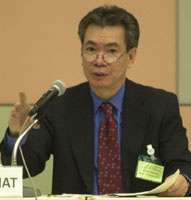 |
Charas
Mayra, Secretariat,
|
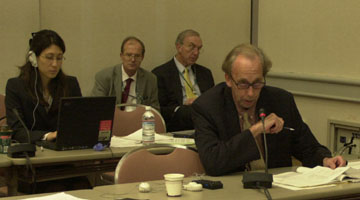 |
|
Schio Ishii,
President, EDS Laboratory, and Koichi Hagiwara, UNIDO (Khagiwara@unido.jp;
http://www.unido.or.jp)
Ecology
Dry System Programme and UNIDO's promotion of this process.
The EDS Process: will contribute to realize a resource recycling
society by epoch-making utilization of tress (rapidly growing
trees and thinned out tress) which have been heretofore deserted,
and will preserve forest environment and global environment;
can produce processed woods having high commercial values, and
will create a new economic dimension; and will bring large employment
and achieve better economies in developing countries in the
tropics and the subtropics.
|
|



